Legal Analysis: Company Incorporation, Liabilities, and Case Law
VerifiedAdded on 2023/01/09
|11
|3752
|44
Report
AI Summary
This report provides a comprehensive overview of the legal aspects of business incorporation, focusing primarily on the Companies Act 2006 of the United Kingdom. It delves into the process of company incorporation, referencing relevant legislation and case law, including a detailed analysis of Salomon v A Salomon, to explain the principles of corporate personality and limited liability. The report also examines the advantages and disadvantages of a separate legal entity and limited liability, offering a critical analysis of these concepts within the framework of UK company law. The document discusses key elements such as the duties of directors, the significance of the Memorandum of Association and Articles of Association, and the implications of corporate veil, emphasizing its importance in understanding the legal standing and obligations of companies in the UK.
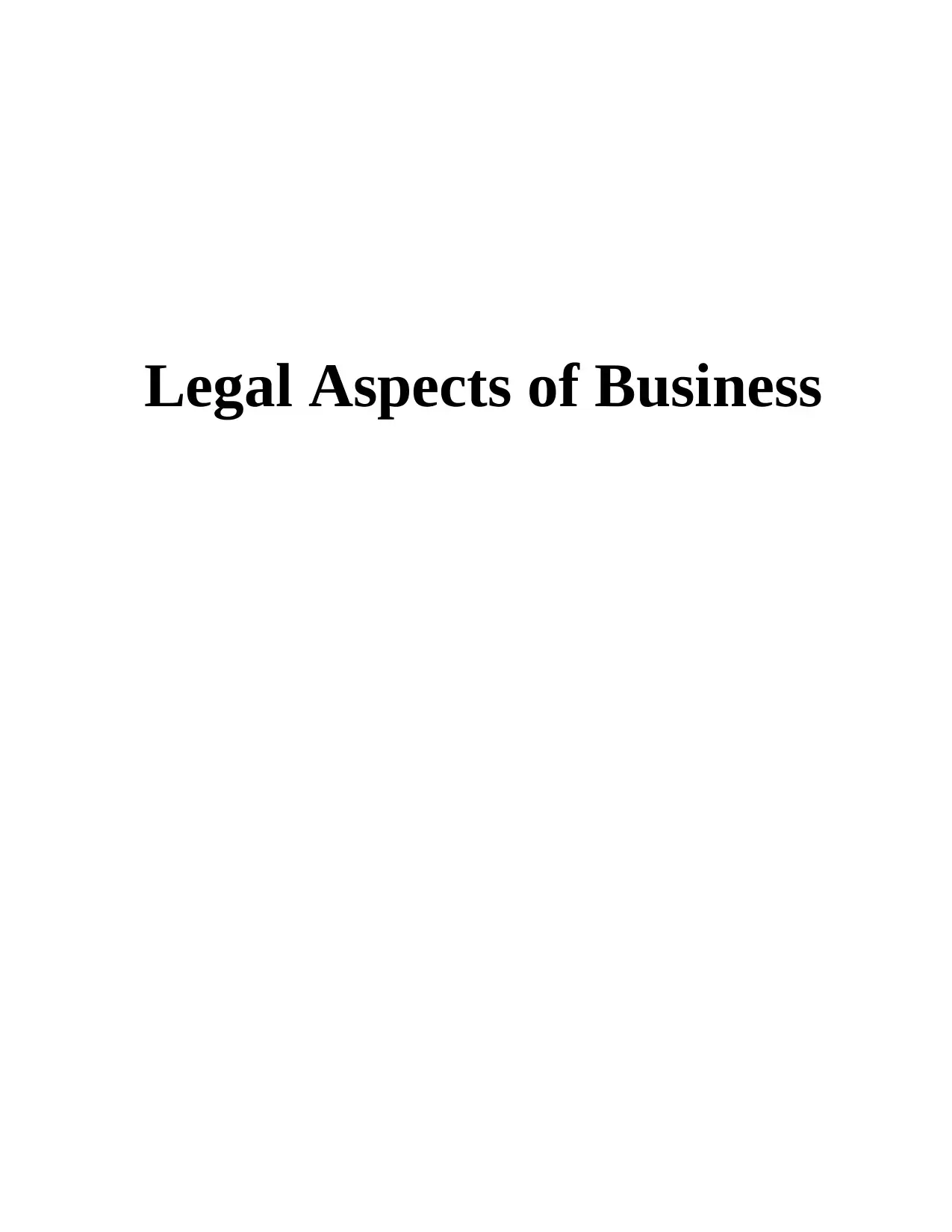
Legal Aspects of Business
Paraphrase This Document
Need a fresh take? Get an instant paraphrase of this document with our AI Paraphraser
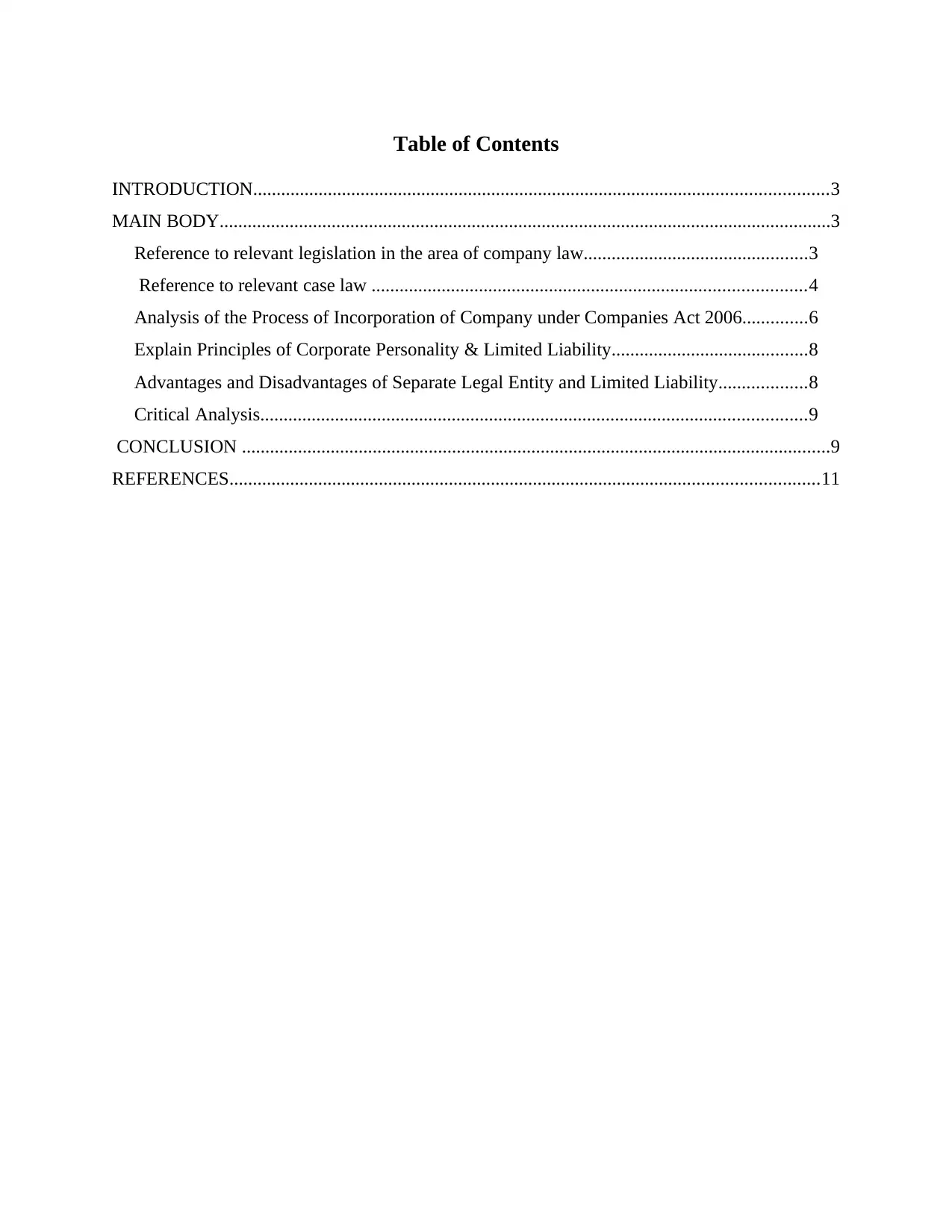
Table of Contents
INTRODUCTION...........................................................................................................................3
MAIN BODY...................................................................................................................................3
Reference to relevant legislation in the area of company law................................................3
Reference to relevant case law .............................................................................................4
Analysis of the Process of Incorporation of Company under Companies Act 2006..............6
Explain Principles of Corporate Personality & Limited Liability..........................................8
Advantages and Disadvantages of Separate Legal Entity and Limited Liability...................8
Critical Analysis.....................................................................................................................9
CONCLUSION ..............................................................................................................................9
REFERENCES..............................................................................................................................11
INTRODUCTION...........................................................................................................................3
MAIN BODY...................................................................................................................................3
Reference to relevant legislation in the area of company law................................................3
Reference to relevant case law .............................................................................................4
Analysis of the Process of Incorporation of Company under Companies Act 2006..............6
Explain Principles of Corporate Personality & Limited Liability..........................................8
Advantages and Disadvantages of Separate Legal Entity and Limited Liability...................8
Critical Analysis.....................................................................................................................9
CONCLUSION ..............................................................................................................................9
REFERENCES..............................................................................................................................11
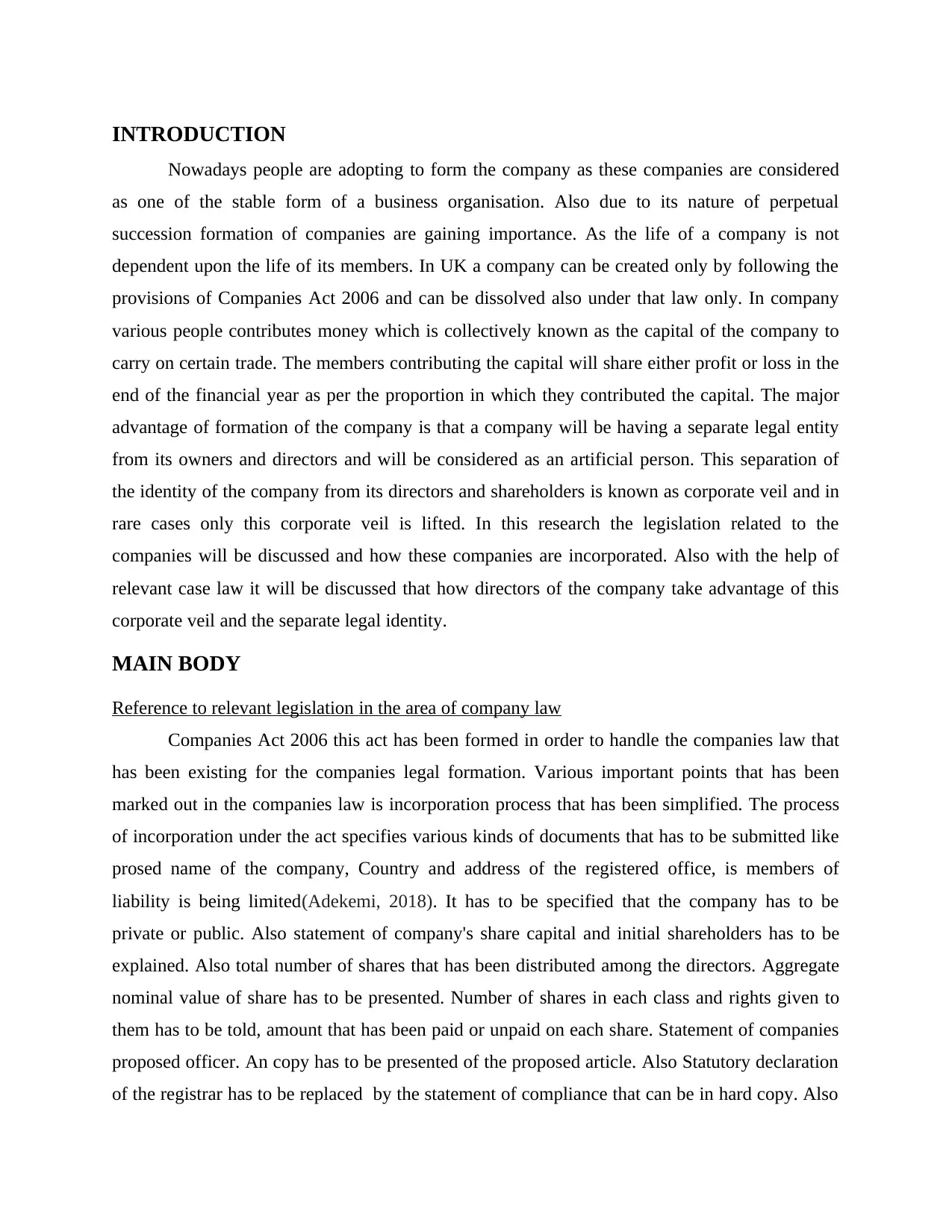
INTRODUCTION
Nowadays people are adopting to form the company as these companies are considered
as one of the stable form of a business organisation. Also due to its nature of perpetual
succession formation of companies are gaining importance. As the life of a company is not
dependent upon the life of its members. In UK a company can be created only by following the
provisions of Companies Act 2006 and can be dissolved also under that law only. In company
various people contributes money which is collectively known as the capital of the company to
carry on certain trade. The members contributing the capital will share either profit or loss in the
end of the financial year as per the proportion in which they contributed the capital. The major
advantage of formation of the company is that a company will be having a separate legal entity
from its owners and directors and will be considered as an artificial person. This separation of
the identity of the company from its directors and shareholders is known as corporate veil and in
rare cases only this corporate veil is lifted. In this research the legislation related to the
companies will be discussed and how these companies are incorporated. Also with the help of
relevant case law it will be discussed that how directors of the company take advantage of this
corporate veil and the separate legal identity.
MAIN BODY
Reference to relevant legislation in the area of company law
Companies Act 2006 this act has been formed in order to handle the companies law that
has been existing for the companies legal formation. Various important points that has been
marked out in the companies law is incorporation process that has been simplified. The process
of incorporation under the act specifies various kinds of documents that has to be submitted like
prosed name of the company, Country and address of the registered office, is members of
liability is being limited(Adekemi, 2018). It has to be specified that the company has to be
private or public. Also statement of company's share capital and initial shareholders has to be
explained. Also total number of shares that has been distributed among the directors. Aggregate
nominal value of share has to be presented. Number of shares in each class and rights given to
them has to be told, amount that has been paid or unpaid on each share. Statement of companies
proposed officer. An copy has to be presented of the proposed article. Also Statutory declaration
of the registrar has to be replaced by the statement of compliance that can be in hard copy. Also
Nowadays people are adopting to form the company as these companies are considered
as one of the stable form of a business organisation. Also due to its nature of perpetual
succession formation of companies are gaining importance. As the life of a company is not
dependent upon the life of its members. In UK a company can be created only by following the
provisions of Companies Act 2006 and can be dissolved also under that law only. In company
various people contributes money which is collectively known as the capital of the company to
carry on certain trade. The members contributing the capital will share either profit or loss in the
end of the financial year as per the proportion in which they contributed the capital. The major
advantage of formation of the company is that a company will be having a separate legal entity
from its owners and directors and will be considered as an artificial person. This separation of
the identity of the company from its directors and shareholders is known as corporate veil and in
rare cases only this corporate veil is lifted. In this research the legislation related to the
companies will be discussed and how these companies are incorporated. Also with the help of
relevant case law it will be discussed that how directors of the company take advantage of this
corporate veil and the separate legal identity.
MAIN BODY
Reference to relevant legislation in the area of company law
Companies Act 2006 this act has been formed in order to handle the companies law that
has been existing for the companies legal formation. Various important points that has been
marked out in the companies law is incorporation process that has been simplified. The process
of incorporation under the act specifies various kinds of documents that has to be submitted like
prosed name of the company, Country and address of the registered office, is members of
liability is being limited(Adekemi, 2018). It has to be specified that the company has to be
private or public. Also statement of company's share capital and initial shareholders has to be
explained. Also total number of shares that has been distributed among the directors. Aggregate
nominal value of share has to be presented. Number of shares in each class and rights given to
them has to be told, amount that has been paid or unpaid on each share. Statement of companies
proposed officer. An copy has to be presented of the proposed article. Also Statutory declaration
of the registrar has to be replaced by the statement of compliance that can be in hard copy. Also
⊘ This is a preview!⊘
Do you want full access?
Subscribe today to unlock all pages.

Trusted by 1+ million students worldwide
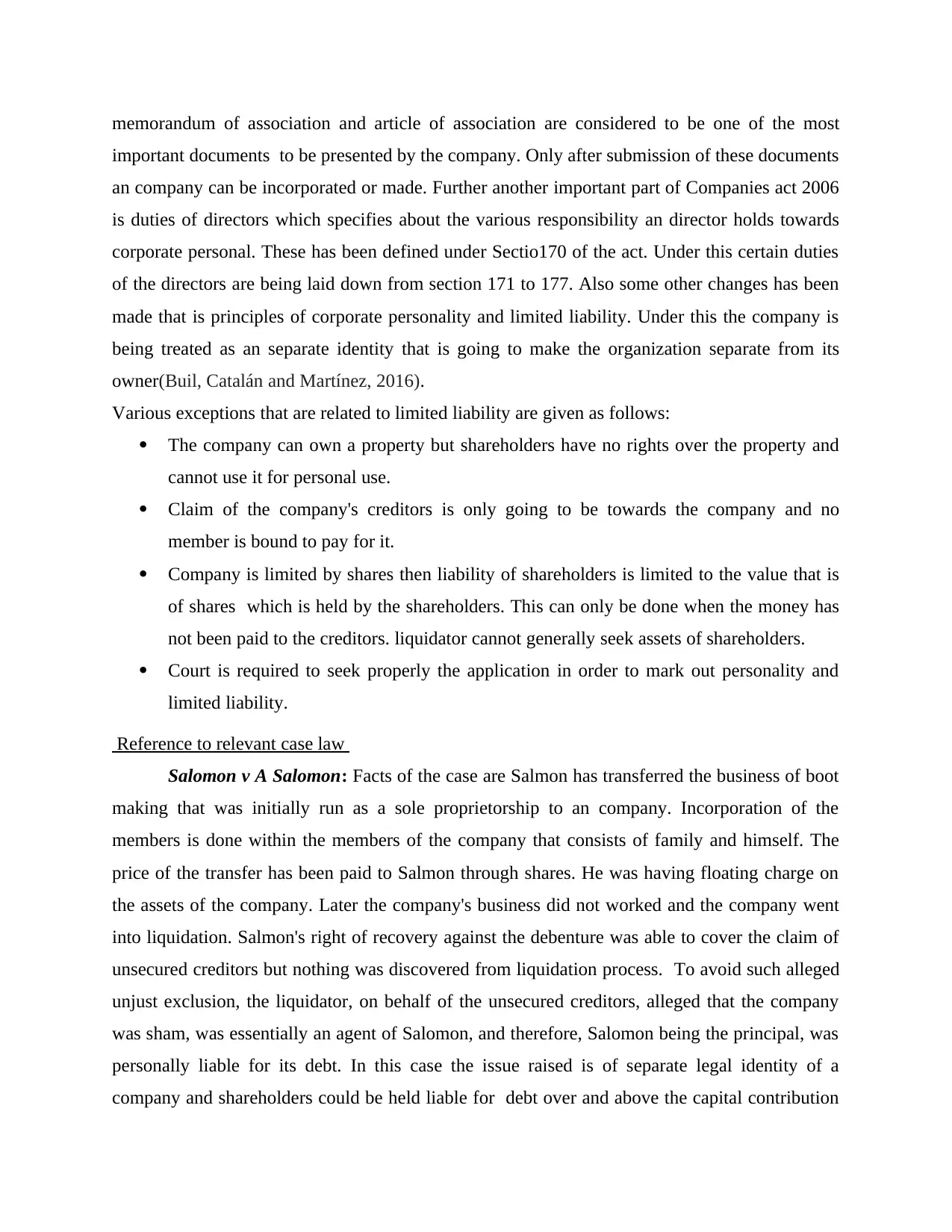
memorandum of association and article of association are considered to be one of the most
important documents to be presented by the company. Only after submission of these documents
an company can be incorporated or made. Further another important part of Companies act 2006
is duties of directors which specifies about the various responsibility an director holds towards
corporate personal. These has been defined under Sectio170 of the act. Under this certain duties
of the directors are being laid down from section 171 to 177. Also some other changes has been
made that is principles of corporate personality and limited liability. Under this the company is
being treated as an separate identity that is going to make the organization separate from its
owner(Buil, Catalán and Martínez, 2016).
Various exceptions that are related to limited liability are given as follows:
The company can own a property but shareholders have no rights over the property and
cannot use it for personal use.
Claim of the company's creditors is only going to be towards the company and no
member is bound to pay for it.
Company is limited by shares then liability of shareholders is limited to the value that is
of shares which is held by the shareholders. This can only be done when the money has
not been paid to the creditors. liquidator cannot generally seek assets of shareholders.
Court is required to seek properly the application in order to mark out personality and
limited liability.
Reference to relevant case law
Salomon v A Salomon: Facts of the case are Salmon has transferred the business of boot
making that was initially run as a sole proprietorship to an company. Incorporation of the
members is done within the members of the company that consists of family and himself. The
price of the transfer has been paid to Salmon through shares. He was having floating charge on
the assets of the company. Later the company's business did not worked and the company went
into liquidation. Salmon's right of recovery against the debenture was able to cover the claim of
unsecured creditors but nothing was discovered from liquidation process. To avoid such alleged
unjust exclusion, the liquidator, on behalf of the unsecured creditors, alleged that the company
was sham, was essentially an agent of Salomon, and therefore, Salomon being the principal, was
personally liable for its debt. In this case the issue raised is of separate legal identity of a
company and shareholders could be held liable for debt over and above the capital contribution
important documents to be presented by the company. Only after submission of these documents
an company can be incorporated or made. Further another important part of Companies act 2006
is duties of directors which specifies about the various responsibility an director holds towards
corporate personal. These has been defined under Sectio170 of the act. Under this certain duties
of the directors are being laid down from section 171 to 177. Also some other changes has been
made that is principles of corporate personality and limited liability. Under this the company is
being treated as an separate identity that is going to make the organization separate from its
owner(Buil, Catalán and Martínez, 2016).
Various exceptions that are related to limited liability are given as follows:
The company can own a property but shareholders have no rights over the property and
cannot use it for personal use.
Claim of the company's creditors is only going to be towards the company and no
member is bound to pay for it.
Company is limited by shares then liability of shareholders is limited to the value that is
of shares which is held by the shareholders. This can only be done when the money has
not been paid to the creditors. liquidator cannot generally seek assets of shareholders.
Court is required to seek properly the application in order to mark out personality and
limited liability.
Reference to relevant case law
Salomon v A Salomon: Facts of the case are Salmon has transferred the business of boot
making that was initially run as a sole proprietorship to an company. Incorporation of the
members is done within the members of the company that consists of family and himself. The
price of the transfer has been paid to Salmon through shares. He was having floating charge on
the assets of the company. Later the company's business did not worked and the company went
into liquidation. Salmon's right of recovery against the debenture was able to cover the claim of
unsecured creditors but nothing was discovered from liquidation process. To avoid such alleged
unjust exclusion, the liquidator, on behalf of the unsecured creditors, alleged that the company
was sham, was essentially an agent of Salomon, and therefore, Salomon being the principal, was
personally liable for its debt. In this case the issue raised is of separate legal identity of a
company and shareholders could be held liable for debt over and above the capital contribution
Paraphrase This Document
Need a fresh take? Get an instant paraphrase of this document with our AI Paraphraser
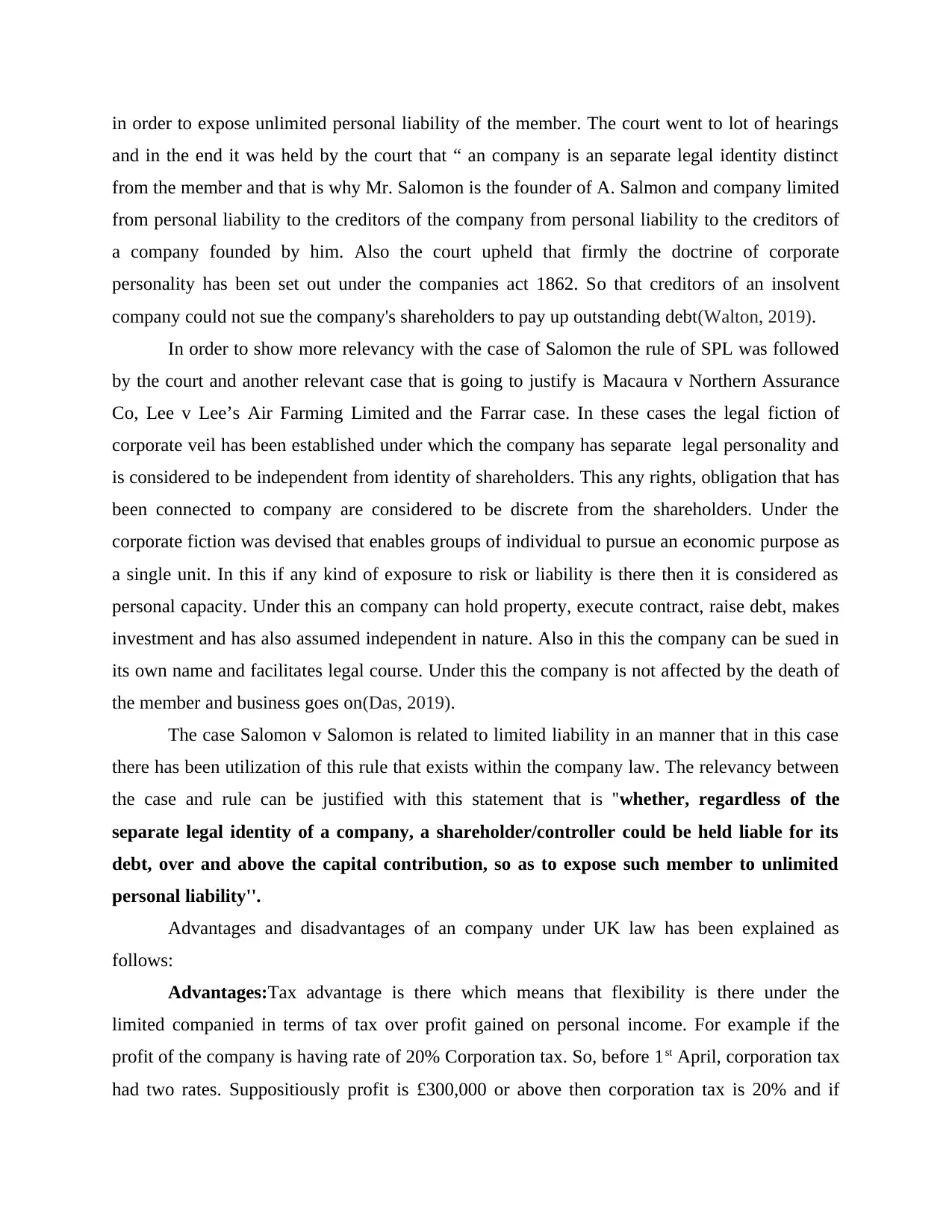
in order to expose unlimited personal liability of the member. The court went to lot of hearings
and in the end it was held by the court that “ an company is an separate legal identity distinct
from the member and that is why Mr. Salomon is the founder of A. Salmon and company limited
from personal liability to the creditors of the company from personal liability to the creditors of
a company founded by him. Also the court upheld that firmly the doctrine of corporate
personality has been set out under the companies act 1862. So that creditors of an insolvent
company could not sue the company's shareholders to pay up outstanding debt(Walton, 2019).
In order to show more relevancy with the case of Salomon the rule of SPL was followed
by the court and another relevant case that is going to justify is Macaura v Northern Assurance
Co, Lee v Lee’s Air Farming Limited and the Farrar case. In these cases the legal fiction of
corporate veil has been established under which the company has separate legal personality and
is considered to be independent from identity of shareholders. This any rights, obligation that has
been connected to company are considered to be discrete from the shareholders. Under the
corporate fiction was devised that enables groups of individual to pursue an economic purpose as
a single unit. In this if any kind of exposure to risk or liability is there then it is considered as
personal capacity. Under this an company can hold property, execute contract, raise debt, makes
investment and has also assumed independent in nature. Also in this the company can be sued in
its own name and facilitates legal course. Under this the company is not affected by the death of
the member and business goes on(Das, 2019).
The case Salomon v Salomon is related to limited liability in an manner that in this case
there has been utilization of this rule that exists within the company law. The relevancy between
the case and rule can be justified with this statement that is ''whether, regardless of the
separate legal identity of a company, a shareholder/controller could be held liable for its
debt, over and above the capital contribution, so as to expose such member to unlimited
personal liability''.
Advantages and disadvantages of an company under UK law has been explained as
follows:
Advantages:Tax advantage is there which means that flexibility is there under the
limited companied in terms of tax over profit gained on personal income. For example if the
profit of the company is having rate of 20% Corporation tax. So, before 1st April, corporation tax
had two rates. Suppositiously profit is £300,000 or above then corporation tax is 20% and if
and in the end it was held by the court that “ an company is an separate legal identity distinct
from the member and that is why Mr. Salomon is the founder of A. Salmon and company limited
from personal liability to the creditors of the company from personal liability to the creditors of
a company founded by him. Also the court upheld that firmly the doctrine of corporate
personality has been set out under the companies act 1862. So that creditors of an insolvent
company could not sue the company's shareholders to pay up outstanding debt(Walton, 2019).
In order to show more relevancy with the case of Salomon the rule of SPL was followed
by the court and another relevant case that is going to justify is Macaura v Northern Assurance
Co, Lee v Lee’s Air Farming Limited and the Farrar case. In these cases the legal fiction of
corporate veil has been established under which the company has separate legal personality and
is considered to be independent from identity of shareholders. This any rights, obligation that has
been connected to company are considered to be discrete from the shareholders. Under the
corporate fiction was devised that enables groups of individual to pursue an economic purpose as
a single unit. In this if any kind of exposure to risk or liability is there then it is considered as
personal capacity. Under this an company can hold property, execute contract, raise debt, makes
investment and has also assumed independent in nature. Also in this the company can be sued in
its own name and facilitates legal course. Under this the company is not affected by the death of
the member and business goes on(Das, 2019).
The case Salomon v Salomon is related to limited liability in an manner that in this case
there has been utilization of this rule that exists within the company law. The relevancy between
the case and rule can be justified with this statement that is ''whether, regardless of the
separate legal identity of a company, a shareholder/controller could be held liable for its
debt, over and above the capital contribution, so as to expose such member to unlimited
personal liability''.
Advantages and disadvantages of an company under UK law has been explained as
follows:
Advantages:Tax advantage is there which means that flexibility is there under the
limited companied in terms of tax over profit gained on personal income. For example if the
profit of the company is having rate of 20% Corporation tax. So, before 1st April, corporation tax
had two rates. Suppositiously profit is £300,000 or above then corporation tax is 20% and if
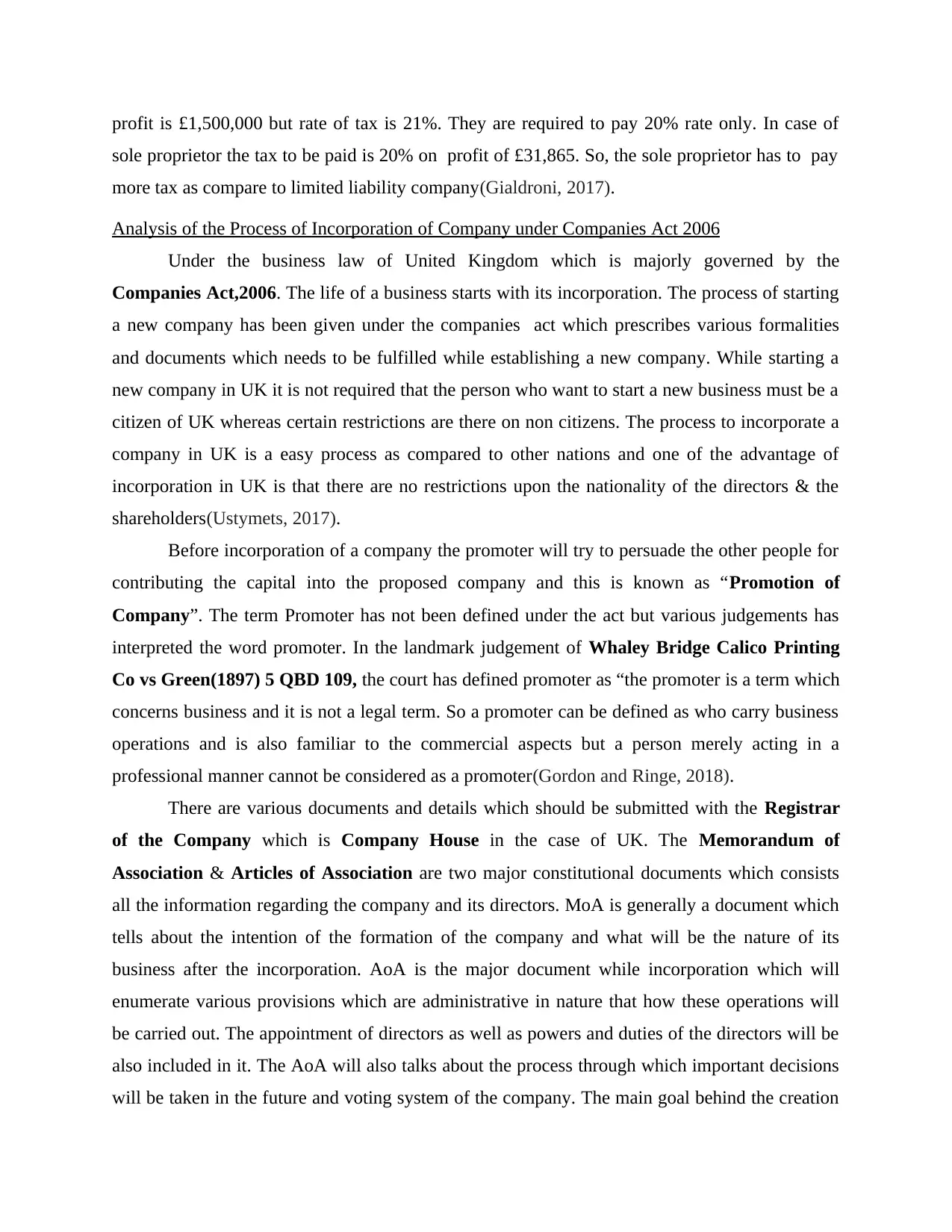
profit is £1,500,000 but rate of tax is 21%. They are required to pay 20% rate only. In case of
sole proprietor the tax to be paid is 20% on profit of £31,865. So, the sole proprietor has to pay
more tax as compare to limited liability company(Gialdroni, 2017).
Analysis of the Process of Incorporation of Company under Companies Act 2006
Under the business law of United Kingdom which is majorly governed by the
Companies Act,2006. The life of a business starts with its incorporation. The process of starting
a new company has been given under the companies act which prescribes various formalities
and documents which needs to be fulfilled while establishing a new company. While starting a
new company in UK it is not required that the person who want to start a new business must be a
citizen of UK whereas certain restrictions are there on non citizens. The process to incorporate a
company in UK is a easy process as compared to other nations and one of the advantage of
incorporation in UK is that there are no restrictions upon the nationality of the directors & the
shareholders(Ustymets, 2017).
Before incorporation of a company the promoter will try to persuade the other people for
contributing the capital into the proposed company and this is known as “Promotion of
Company”. The term Promoter has not been defined under the act but various judgements has
interpreted the word promoter. In the landmark judgement of Whaley Bridge Calico Printing
Co vs Green(1897) 5 QBD 109, the court has defined promoter as “the promoter is a term which
concerns business and it is not a legal term. So a promoter can be defined as who carry business
operations and is also familiar to the commercial aspects but a person merely acting in a
professional manner cannot be considered as a promoter(Gordon and Ringe, 2018).
There are various documents and details which should be submitted with the Registrar
of the Company which is Company House in the case of UK. The Memorandum of
Association & Articles of Association are two major constitutional documents which consists
all the information regarding the company and its directors. MoA is generally a document which
tells about the intention of the formation of the company and what will be the nature of its
business after the incorporation. AoA is the major document while incorporation which will
enumerate various provisions which are administrative in nature that how these operations will
be carried out. The appointment of directors as well as powers and duties of the directors will be
also included in it. The AoA will also talks about the process through which important decisions
will be taken in the future and voting system of the company. The main goal behind the creation
sole proprietor the tax to be paid is 20% on profit of £31,865. So, the sole proprietor has to pay
more tax as compare to limited liability company(Gialdroni, 2017).
Analysis of the Process of Incorporation of Company under Companies Act 2006
Under the business law of United Kingdom which is majorly governed by the
Companies Act,2006. The life of a business starts with its incorporation. The process of starting
a new company has been given under the companies act which prescribes various formalities
and documents which needs to be fulfilled while establishing a new company. While starting a
new company in UK it is not required that the person who want to start a new business must be a
citizen of UK whereas certain restrictions are there on non citizens. The process to incorporate a
company in UK is a easy process as compared to other nations and one of the advantage of
incorporation in UK is that there are no restrictions upon the nationality of the directors & the
shareholders(Ustymets, 2017).
Before incorporation of a company the promoter will try to persuade the other people for
contributing the capital into the proposed company and this is known as “Promotion of
Company”. The term Promoter has not been defined under the act but various judgements has
interpreted the word promoter. In the landmark judgement of Whaley Bridge Calico Printing
Co vs Green(1897) 5 QBD 109, the court has defined promoter as “the promoter is a term which
concerns business and it is not a legal term. So a promoter can be defined as who carry business
operations and is also familiar to the commercial aspects but a person merely acting in a
professional manner cannot be considered as a promoter(Gordon and Ringe, 2018).
There are various documents and details which should be submitted with the Registrar
of the Company which is Company House in the case of UK. The Memorandum of
Association & Articles of Association are two major constitutional documents which consists
all the information regarding the company and its directors. MoA is generally a document which
tells about the intention of the formation of the company and what will be the nature of its
business after the incorporation. AoA is the major document while incorporation which will
enumerate various provisions which are administrative in nature that how these operations will
be carried out. The appointment of directors as well as powers and duties of the directors will be
also included in it. The AoA will also talks about the process through which important decisions
will be taken in the future and voting system of the company. The main goal behind the creation
⊘ This is a preview!⊘
Do you want full access?
Subscribe today to unlock all pages.

Trusted by 1+ million students worldwide
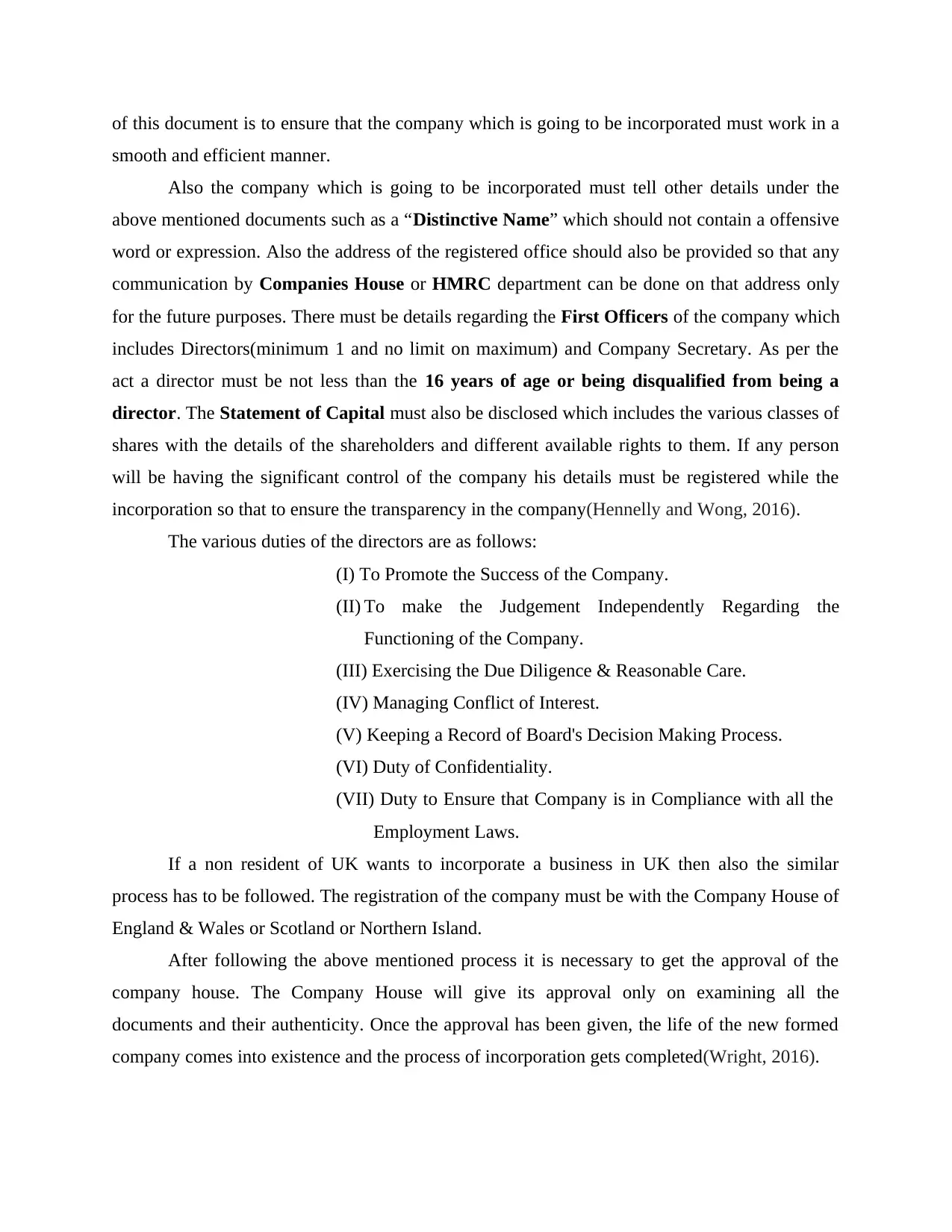
of this document is to ensure that the company which is going to be incorporated must work in a
smooth and efficient manner.
Also the company which is going to be incorporated must tell other details under the
above mentioned documents such as a “Distinctive Name” which should not contain a offensive
word or expression. Also the address of the registered office should also be provided so that any
communication by Companies House or HMRC department can be done on that address only
for the future purposes. There must be details regarding the First Officers of the company which
includes Directors(minimum 1 and no limit on maximum) and Company Secretary. As per the
act a director must be not less than the 16 years of age or being disqualified from being a
director. The Statement of Capital must also be disclosed which includes the various classes of
shares with the details of the shareholders and different available rights to them. If any person
will be having the significant control of the company his details must be registered while the
incorporation so that to ensure the transparency in the company(Hennelly and Wong, 2016).
The various duties of the directors are as follows:
(I) To Promote the Success of the Company.
(II) To make the Judgement Independently Regarding the
Functioning of the Company.
(III) Exercising the Due Diligence & Reasonable Care.
(IV) Managing Conflict of Interest.
(V) Keeping a Record of Board's Decision Making Process.
(VI) Duty of Confidentiality.
(VII) Duty to Ensure that Company is in Compliance with all the
Employment Laws.
If a non resident of UK wants to incorporate a business in UK then also the similar
process has to be followed. The registration of the company must be with the Company House of
England & Wales or Scotland or Northern Island.
After following the above mentioned process it is necessary to get the approval of the
company house. The Company House will give its approval only on examining all the
documents and their authenticity. Once the approval has been given, the life of the new formed
company comes into existence and the process of incorporation gets completed(Wright, 2016).
smooth and efficient manner.
Also the company which is going to be incorporated must tell other details under the
above mentioned documents such as a “Distinctive Name” which should not contain a offensive
word or expression. Also the address of the registered office should also be provided so that any
communication by Companies House or HMRC department can be done on that address only
for the future purposes. There must be details regarding the First Officers of the company which
includes Directors(minimum 1 and no limit on maximum) and Company Secretary. As per the
act a director must be not less than the 16 years of age or being disqualified from being a
director. The Statement of Capital must also be disclosed which includes the various classes of
shares with the details of the shareholders and different available rights to them. If any person
will be having the significant control of the company his details must be registered while the
incorporation so that to ensure the transparency in the company(Hennelly and Wong, 2016).
The various duties of the directors are as follows:
(I) To Promote the Success of the Company.
(II) To make the Judgement Independently Regarding the
Functioning of the Company.
(III) Exercising the Due Diligence & Reasonable Care.
(IV) Managing Conflict of Interest.
(V) Keeping a Record of Board's Decision Making Process.
(VI) Duty of Confidentiality.
(VII) Duty to Ensure that Company is in Compliance with all the
Employment Laws.
If a non resident of UK wants to incorporate a business in UK then also the similar
process has to be followed. The registration of the company must be with the Company House of
England & Wales or Scotland or Northern Island.
After following the above mentioned process it is necessary to get the approval of the
company house. The Company House will give its approval only on examining all the
documents and their authenticity. Once the approval has been given, the life of the new formed
company comes into existence and the process of incorporation gets completed(Wright, 2016).
Paraphrase This Document
Need a fresh take? Get an instant paraphrase of this document with our AI Paraphraser
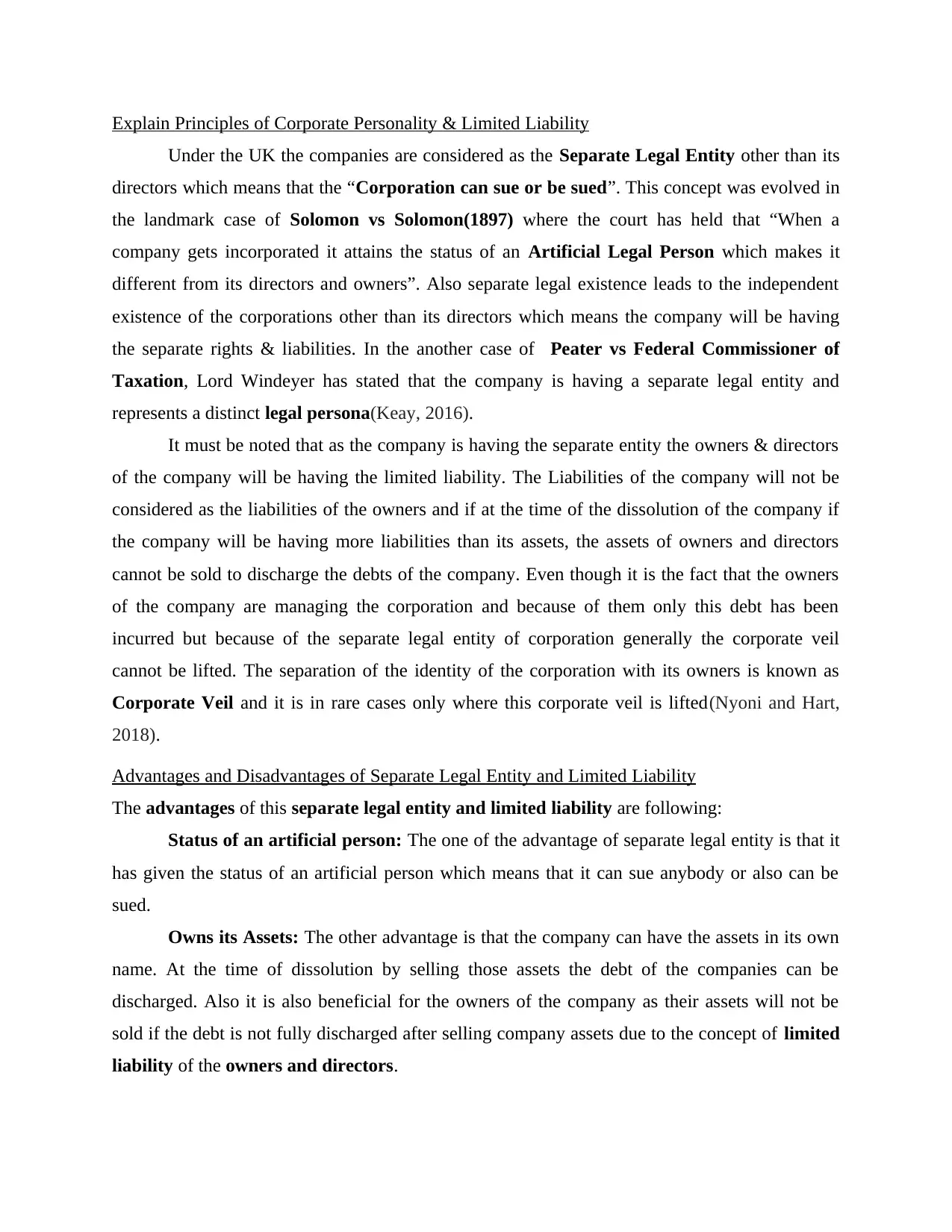
Explain Principles of Corporate Personality & Limited Liability
Under the UK the companies are considered as the Separate Legal Entity other than its
directors which means that the “Corporation can sue or be sued”. This concept was evolved in
the landmark case of Solomon vs Solomon(1897) where the court has held that “When a
company gets incorporated it attains the status of an Artificial Legal Person which makes it
different from its directors and owners”. Also separate legal existence leads to the independent
existence of the corporations other than its directors which means the company will be having
the separate rights & liabilities. In the another case of Peater vs Federal Commissioner of
Taxation, Lord Windeyer has stated that the company is having a separate legal entity and
represents a distinct legal persona(Keay, 2016).
It must be noted that as the company is having the separate entity the owners & directors
of the company will be having the limited liability. The Liabilities of the company will not be
considered as the liabilities of the owners and if at the time of the dissolution of the company if
the company will be having more liabilities than its assets, the assets of owners and directors
cannot be sold to discharge the debts of the company. Even though it is the fact that the owners
of the company are managing the corporation and because of them only this debt has been
incurred but because of the separate legal entity of corporation generally the corporate veil
cannot be lifted. The separation of the identity of the corporation with its owners is known as
Corporate Veil and it is in rare cases only where this corporate veil is lifted(Nyoni and Hart,
2018).
Advantages and Disadvantages of Separate Legal Entity and Limited Liability
The advantages of this separate legal entity and limited liability are following:
Status of an artificial person: The one of the advantage of separate legal entity is that it
has given the status of an artificial person which means that it can sue anybody or also can be
sued.
Owns its Assets: The other advantage is that the company can have the assets in its own
name. At the time of dissolution by selling those assets the debt of the companies can be
discharged. Also it is also beneficial for the owners of the company as their assets will not be
sold if the debt is not fully discharged after selling company assets due to the concept of limited
liability of the owners and directors.
Under the UK the companies are considered as the Separate Legal Entity other than its
directors which means that the “Corporation can sue or be sued”. This concept was evolved in
the landmark case of Solomon vs Solomon(1897) where the court has held that “When a
company gets incorporated it attains the status of an Artificial Legal Person which makes it
different from its directors and owners”. Also separate legal existence leads to the independent
existence of the corporations other than its directors which means the company will be having
the separate rights & liabilities. In the another case of Peater vs Federal Commissioner of
Taxation, Lord Windeyer has stated that the company is having a separate legal entity and
represents a distinct legal persona(Keay, 2016).
It must be noted that as the company is having the separate entity the owners & directors
of the company will be having the limited liability. The Liabilities of the company will not be
considered as the liabilities of the owners and if at the time of the dissolution of the company if
the company will be having more liabilities than its assets, the assets of owners and directors
cannot be sold to discharge the debts of the company. Even though it is the fact that the owners
of the company are managing the corporation and because of them only this debt has been
incurred but because of the separate legal entity of corporation generally the corporate veil
cannot be lifted. The separation of the identity of the corporation with its owners is known as
Corporate Veil and it is in rare cases only where this corporate veil is lifted(Nyoni and Hart,
2018).
Advantages and Disadvantages of Separate Legal Entity and Limited Liability
The advantages of this separate legal entity and limited liability are following:
Status of an artificial person: The one of the advantage of separate legal entity is that it
has given the status of an artificial person which means that it can sue anybody or also can be
sued.
Owns its Assets: The other advantage is that the company can have the assets in its own
name. At the time of dissolution by selling those assets the debt of the companies can be
discharged. Also it is also beneficial for the owners of the company as their assets will not be
sold if the debt is not fully discharged after selling company assets due to the concept of limited
liability of the owners and directors.
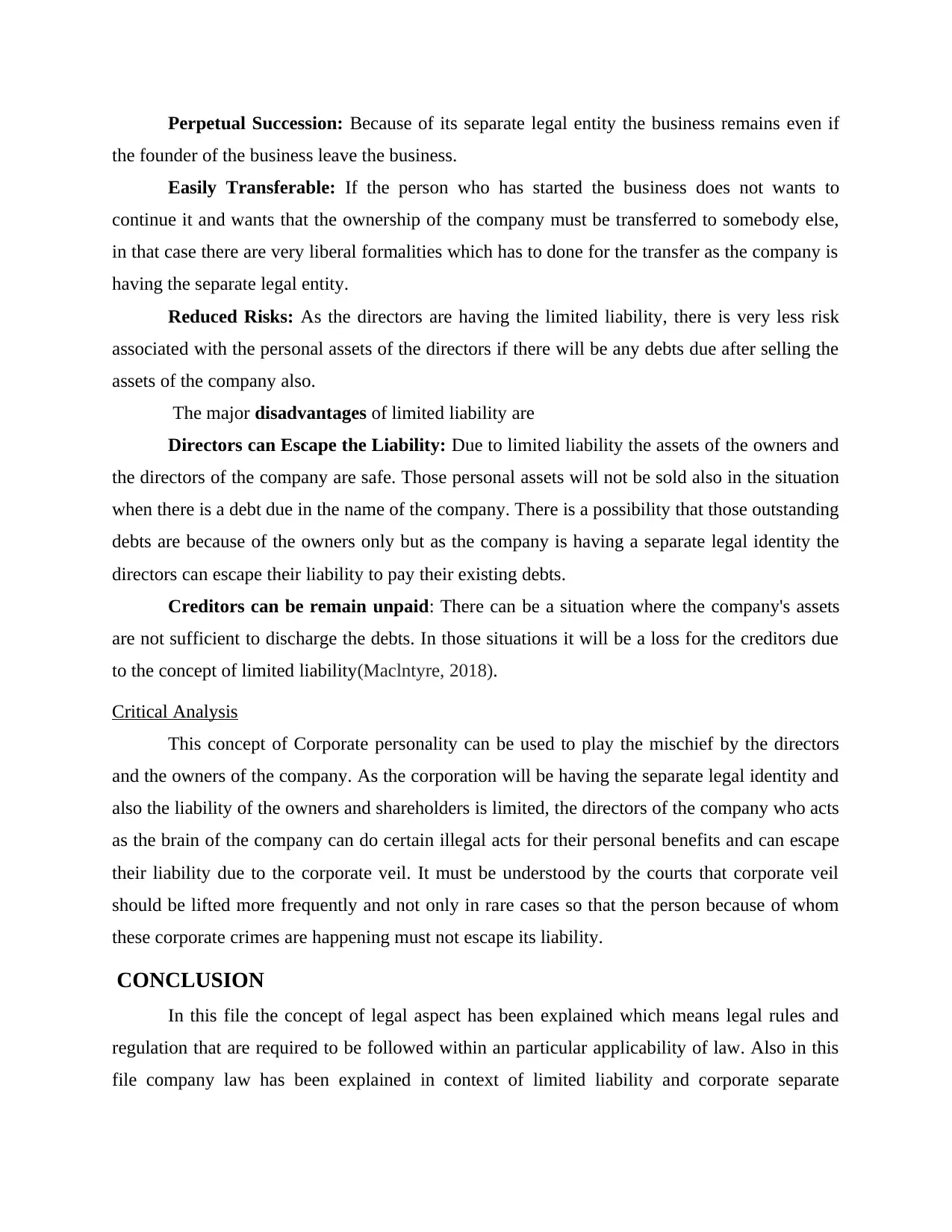
Perpetual Succession: Because of its separate legal entity the business remains even if
the founder of the business leave the business.
Easily Transferable: If the person who has started the business does not wants to
continue it and wants that the ownership of the company must be transferred to somebody else,
in that case there are very liberal formalities which has to done for the transfer as the company is
having the separate legal entity.
Reduced Risks: As the directors are having the limited liability, there is very less risk
associated with the personal assets of the directors if there will be any debts due after selling the
assets of the company also.
The major disadvantages of limited liability are
Directors can Escape the Liability: Due to limited liability the assets of the owners and
the directors of the company are safe. Those personal assets will not be sold also in the situation
when there is a debt due in the name of the company. There is a possibility that those outstanding
debts are because of the owners only but as the company is having a separate legal identity the
directors can escape their liability to pay their existing debts.
Creditors can be remain unpaid: There can be a situation where the company's assets
are not sufficient to discharge the debts. In those situations it will be a loss for the creditors due
to the concept of limited liability(Maclntyre, 2018).
Critical Analysis
This concept of Corporate personality can be used to play the mischief by the directors
and the owners of the company. As the corporation will be having the separate legal identity and
also the liability of the owners and shareholders is limited, the directors of the company who acts
as the brain of the company can do certain illegal acts for their personal benefits and can escape
their liability due to the corporate veil. It must be understood by the courts that corporate veil
should be lifted more frequently and not only in rare cases so that the person because of whom
these corporate crimes are happening must not escape its liability.
CONCLUSION
In this file the concept of legal aspect has been explained which means legal rules and
regulation that are required to be followed within an particular applicability of law. Also in this
file company law has been explained in context of limited liability and corporate separate
the founder of the business leave the business.
Easily Transferable: If the person who has started the business does not wants to
continue it and wants that the ownership of the company must be transferred to somebody else,
in that case there are very liberal formalities which has to done for the transfer as the company is
having the separate legal entity.
Reduced Risks: As the directors are having the limited liability, there is very less risk
associated with the personal assets of the directors if there will be any debts due after selling the
assets of the company also.
The major disadvantages of limited liability are
Directors can Escape the Liability: Due to limited liability the assets of the owners and
the directors of the company are safe. Those personal assets will not be sold also in the situation
when there is a debt due in the name of the company. There is a possibility that those outstanding
debts are because of the owners only but as the company is having a separate legal identity the
directors can escape their liability to pay their existing debts.
Creditors can be remain unpaid: There can be a situation where the company's assets
are not sufficient to discharge the debts. In those situations it will be a loss for the creditors due
to the concept of limited liability(Maclntyre, 2018).
Critical Analysis
This concept of Corporate personality can be used to play the mischief by the directors
and the owners of the company. As the corporation will be having the separate legal identity and
also the liability of the owners and shareholders is limited, the directors of the company who acts
as the brain of the company can do certain illegal acts for their personal benefits and can escape
their liability due to the corporate veil. It must be understood by the courts that corporate veil
should be lifted more frequently and not only in rare cases so that the person because of whom
these corporate crimes are happening must not escape its liability.
CONCLUSION
In this file the concept of legal aspect has been explained which means legal rules and
regulation that are required to be followed within an particular applicability of law. Also in this
file company law has been explained in context of limited liability and corporate separate
⊘ This is a preview!⊘
Do you want full access?
Subscribe today to unlock all pages.

Trusted by 1+ million students worldwide

identity. In this an company is considered to be separate from its owners. Further in this file an
case law has been explained in detail about the concept. Also process of incorporation and
principles of corporate personality has been analysed.
case law has been explained in detail about the concept. Also process of incorporation and
principles of corporate personality has been analysed.
Paraphrase This Document
Need a fresh take? Get an instant paraphrase of this document with our AI Paraphraser
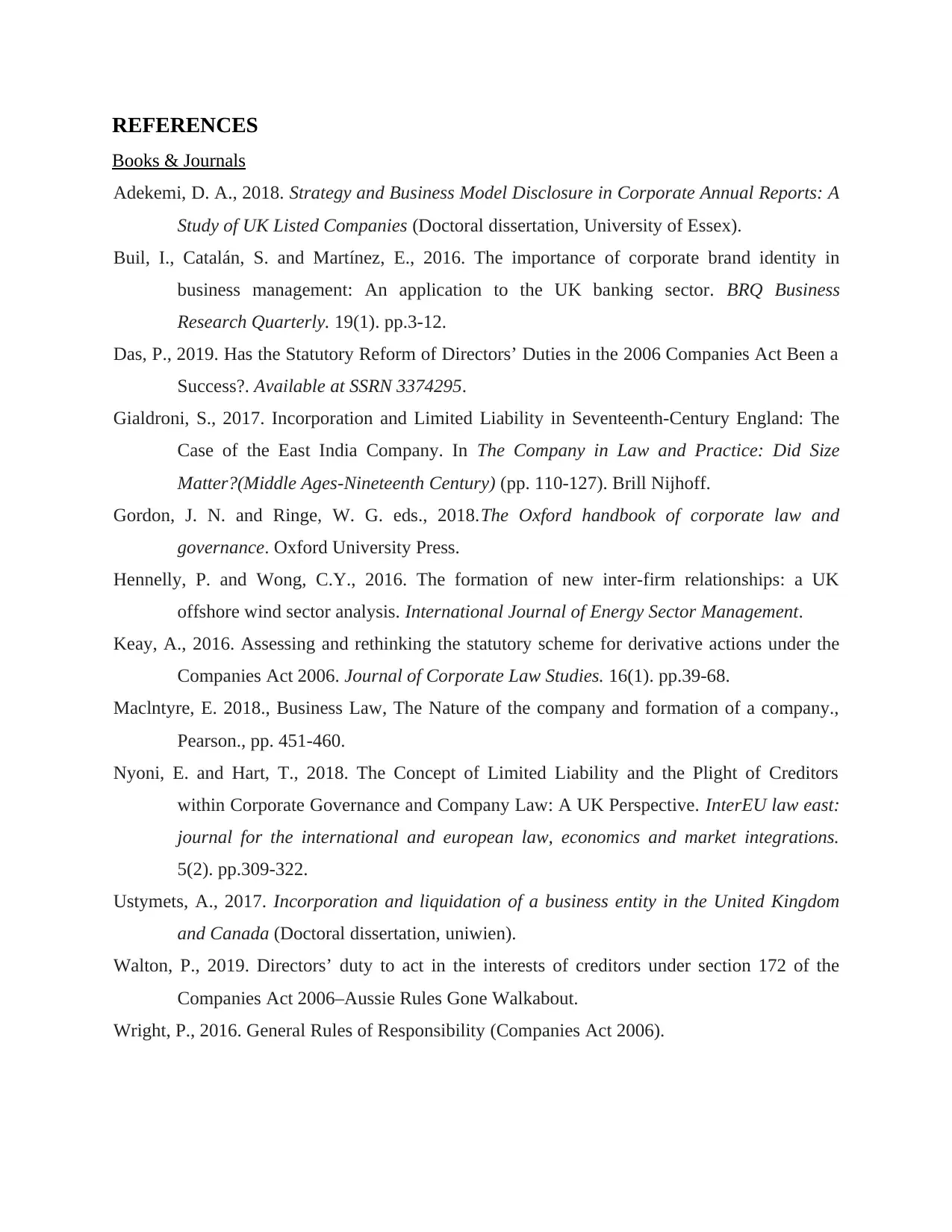
REFERENCES
Books & Journals
Adekemi, D. A., 2018. Strategy and Business Model Disclosure in Corporate Annual Reports: A
Study of UK Listed Companies (Doctoral dissertation, University of Essex).
Buil, I., Catalán, S. and Martínez, E., 2016. The importance of corporate brand identity in
business management: An application to the UK banking sector. BRQ Business
Research Quarterly. 19(1). pp.3-12.
Das, P., 2019. Has the Statutory Reform of Directors’ Duties in the 2006 Companies Act Been a
Success?. Available at SSRN 3374295.
Gialdroni, S., 2017. Incorporation and Limited Liability in Seventeenth-Century England: The
Case of the East India Company. In The Company in Law and Practice: Did Size
Matter?(Middle Ages-Nineteenth Century) (pp. 110-127). Brill Nijhoff.
Gordon, J. N. and Ringe, W. G. eds., 2018.The Oxford handbook of corporate law and
governance. Oxford University Press.
Hennelly, P. and Wong, C.Y., 2016. The formation of new inter-firm relationships: a UK
offshore wind sector analysis. International Journal of Energy Sector Management.
Keay, A., 2016. Assessing and rethinking the statutory scheme for derivative actions under the
Companies Act 2006. Journal of Corporate Law Studies. 16(1). pp.39-68.
Maclntyre, E. 2018., Business Law, The Nature of the company and formation of a company.,
Pearson., pp. 451-460.
Nyoni, E. and Hart, T., 2018. The Concept of Limited Liability and the Plight of Creditors
within Corporate Governance and Company Law: A UK Perspective. InterEU law east:
journal for the international and european law, economics and market integrations.
5(2). pp.309-322.
Ustymets, A., 2017. Incorporation and liquidation of a business entity in the United Kingdom
and Canada (Doctoral dissertation, uniwien).
Walton, P., 2019. Directors’ duty to act in the interests of creditors under section 172 of the
Companies Act 2006–Aussie Rules Gone Walkabout.
Wright, P., 2016. General Rules of Responsibility (Companies Act 2006).
Books & Journals
Adekemi, D. A., 2018. Strategy and Business Model Disclosure in Corporate Annual Reports: A
Study of UK Listed Companies (Doctoral dissertation, University of Essex).
Buil, I., Catalán, S. and Martínez, E., 2016. The importance of corporate brand identity in
business management: An application to the UK banking sector. BRQ Business
Research Quarterly. 19(1). pp.3-12.
Das, P., 2019. Has the Statutory Reform of Directors’ Duties in the 2006 Companies Act Been a
Success?. Available at SSRN 3374295.
Gialdroni, S., 2017. Incorporation and Limited Liability in Seventeenth-Century England: The
Case of the East India Company. In The Company in Law and Practice: Did Size
Matter?(Middle Ages-Nineteenth Century) (pp. 110-127). Brill Nijhoff.
Gordon, J. N. and Ringe, W. G. eds., 2018.The Oxford handbook of corporate law and
governance. Oxford University Press.
Hennelly, P. and Wong, C.Y., 2016. The formation of new inter-firm relationships: a UK
offshore wind sector analysis. International Journal of Energy Sector Management.
Keay, A., 2016. Assessing and rethinking the statutory scheme for derivative actions under the
Companies Act 2006. Journal of Corporate Law Studies. 16(1). pp.39-68.
Maclntyre, E. 2018., Business Law, The Nature of the company and formation of a company.,
Pearson., pp. 451-460.
Nyoni, E. and Hart, T., 2018. The Concept of Limited Liability and the Plight of Creditors
within Corporate Governance and Company Law: A UK Perspective. InterEU law east:
journal for the international and european law, economics and market integrations.
5(2). pp.309-322.
Ustymets, A., 2017. Incorporation and liquidation of a business entity in the United Kingdom
and Canada (Doctoral dissertation, uniwien).
Walton, P., 2019. Directors’ duty to act in the interests of creditors under section 172 of the
Companies Act 2006–Aussie Rules Gone Walkabout.
Wright, P., 2016. General Rules of Responsibility (Companies Act 2006).
1 out of 11
Related Documents
Your All-in-One AI-Powered Toolkit for Academic Success.
+13062052269
info@desklib.com
Available 24*7 on WhatsApp / Email
![[object Object]](/_next/static/media/star-bottom.7253800d.svg)
Unlock your academic potential
Copyright © 2020–2026 A2Z Services. All Rights Reserved. Developed and managed by ZUCOL.





